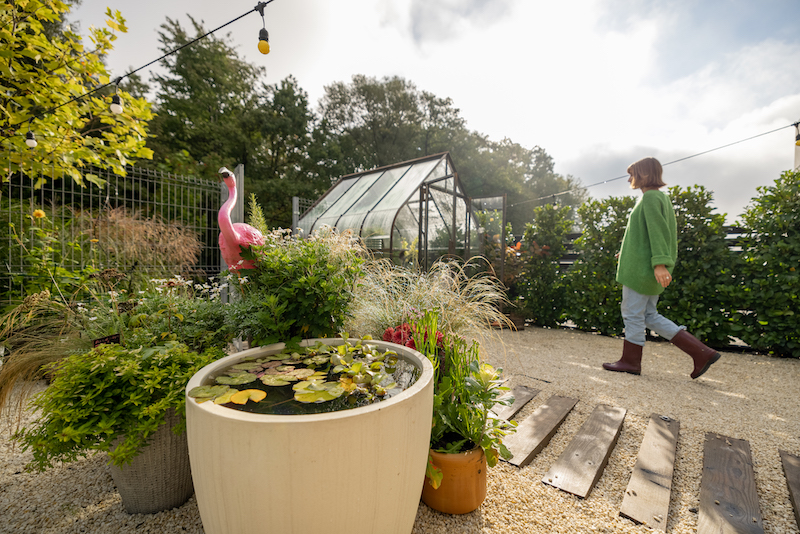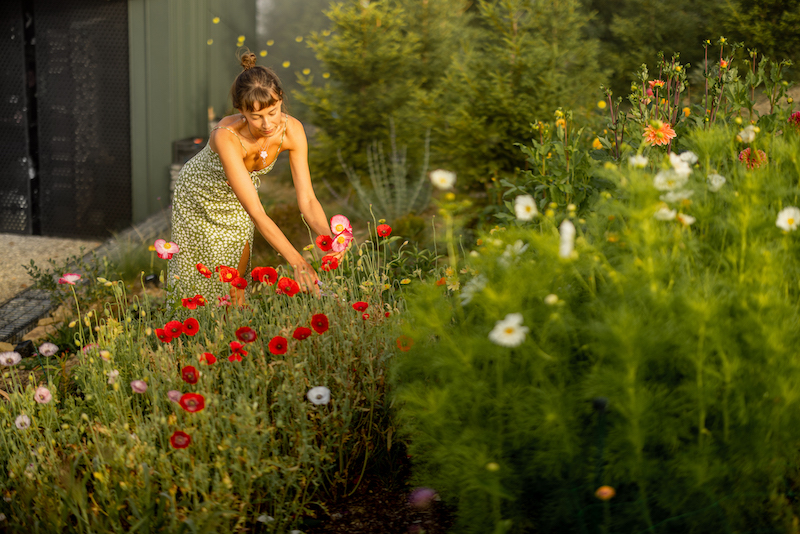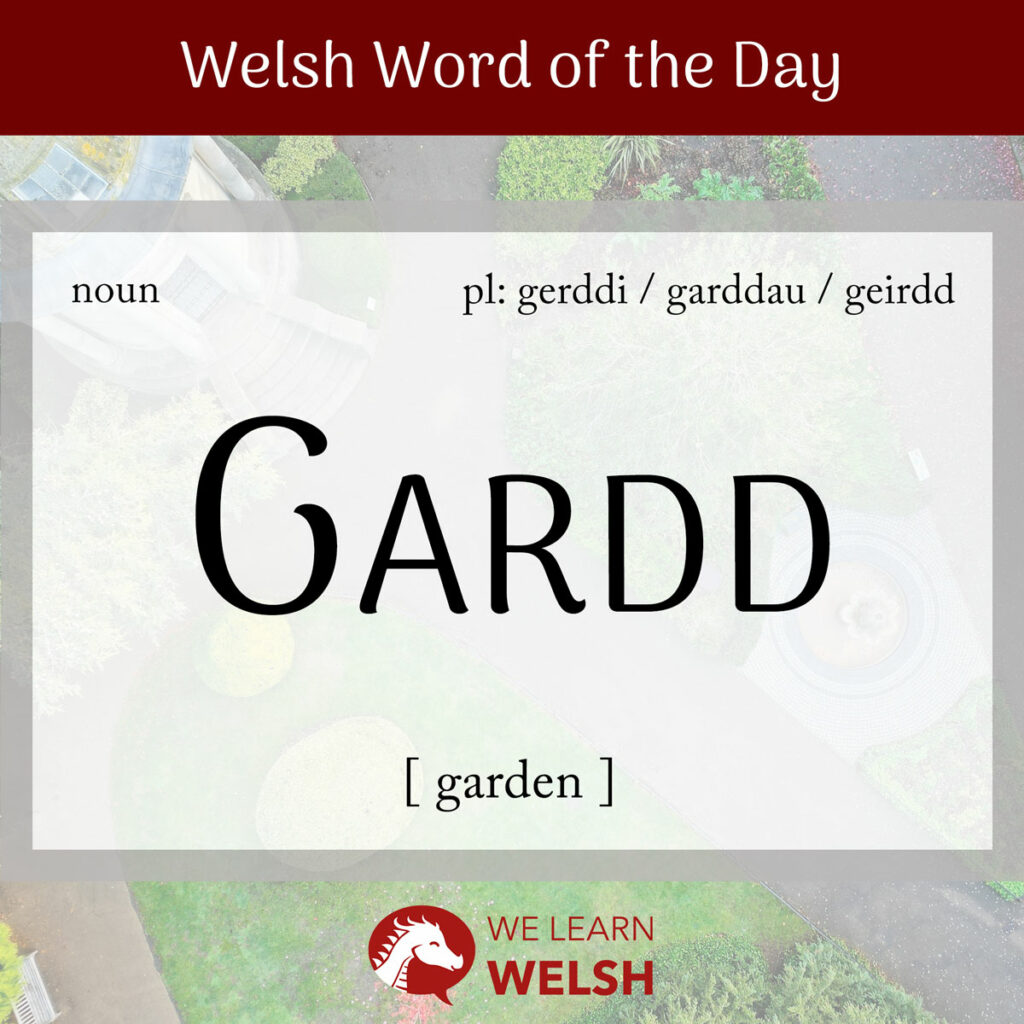The Welsh word for a garden, whether it’s a public park full of rare and beautiful flowers, or your own backyard which you use to grow vegetables in, is gardd. The plural form is gerddi – though you may less commonly encounter garddau or geirdd.
gardd
garden
Gardd was a borrowing from the Old Nose garõr (yard), making it a cognate of the English words yard and garden. And, like its English equivalent, it’s sometimes pronounced with a longer a sound. This is more common in North Wales.
Gardd is susceptible to the soft and nasal, but not the aspirate, mutation. It’s important to note that since it’s a feminine noun, it undergoes a soft mutation after the definite article, becoming yr ardd (the garden). However, garddwr (gardener) is masculine, and remains y garddwr (the gardener).
Soft mutation
ardd
Nasal mutation
ngardd
Aspirate mutation
N/A
In Welsh, we often use gardd more broadly to apply to a fertile region of the land, such as the Vale of Glamorgan being referred to as Gardd Cymru (Wales’ garden). Glamorgan is also known for its cymoedd (valleys), a populous centre of Welsh culture and industry. People from Y Cymoedd (The Valleys) are known for their unique accent, which often bears the brunt of fond mocking!
This word is also used in a figurative sense to refer to a collection or group of beautiful and valuable things – as if comparing them to blodau (flowers) in a gardd. It may be used, for example, to describe a poetry anthology (gardd o gerddi = garden of poems).
Beth sy’n tyfu yn yr ardd?
What’s growing in the garden?
Sometimes, the writings that have won prizes at an Eisteddfod (a traditional Welsh arts and music competition festival) have been collected into a volume titled with the word gardd and the name of the place that Eisteddfod was hosted, as in the case of the anthology Gardd Aberdâr.

Below are listed some types of garden. Because it’s a feminine noun, the adjectives that follow gardd in all of these examples have taken a soft mutation.
- gardd gefn = back garden
- gardd ffrynt = front garden
- gardd lysiau / gardd fresych = vegetable garden
- gardd flodau = flower garden
- gardd gegin / gardd goch = kitchen garden
- gardd farchnad = market garden
- gardd fagai = plant nursery
- gardd fotaneg = botanic garden
- gardd gwrw / gardd yfed = beer garden
Less literal is the gardd wenyn (bee garden) for an apiary, or gardd gladdu (burying garden) for a graveyard. The latter is more commonly mynwent or claddfa.
In the average person’s gardd at home, you’re likely to find glaswellt / gwair (grass) in a lawnt (lawn), blodau (flowers) in garddwelyau (beds), and perhaps some coed (trees) too. Many people also make use of this space to grow llysiau (vegetables) and ffrwythau (fruit). Unfortunately, all these lovely planhigion (plants) are more often than not accompanied by chwyn (weeds).
It’s common, too, to decorate with some cadeiriau ardd (garden chairs). If you’re very fancy, you might have a pwll – this can mean either pond or pool.
Mae gwastraff gardd yn cael ei gasglu bob pythefnos.
Garden waste is collected fortnightly.
In order to keep your garden looking neat, you’ll need equipment including a can dŵr (watering can) or pibell ddŵr (hose-pipe), sisyrn (scissors, here in the sense of garden shears), a rhaca(n) / cribin (rake), thick menig (gloves), and a peiriant torri glaswellt / peiriant torri lawnt (lawnmower).
However, many people these days are taking on the challenge of making their gardd a bit more gwyllt (wild) to support bywyd gwyllt (wildlife) like pili–palod (butterflies) and gwenyn (bees). Ways to do this include letting the lawnt grow long, and seeding blodau gwyllt (wildflowers) that help to support bioamrywiaeth (biodiversity).
Rhaid i mi dyfrio fy ngardd.
I have to water my garden.

Whatever your style of garddwriaeth (gardening), there are plenty of words for it. The most common are garddio and trin gardd (treating/managing the garden). However, in the North-West of Wales, some people instead say gardnio / gardnerio.
Let’s go over some more terms based around the word gardd.
- canolfan (g)arddio = garden centre
- cynnyrch gardd = garden produce
- ffair ardd = fête
- garddwest = fête / garden party
- canwr yr ardd / telor yr ardd = garden warbler
- teigr yr ardd = tiger-moth
- Gardd Eden = The Garden of Eden
- Gerddi Crog Babilon = The Hanging Gardens of Babylon
You’ll also hear it used as an adjective to describe cultivated blodau and llysiau, as in English – think pys gardd (garden peas), persli’r ardd (garden parsley), and moron yr ardd (cultivated carrots).
Byddai’n well ganddo dŷ â gardd.
He would prefer a house with a garden.
If you’re an avid user of the English proverb people in glass houses shouldn’t throw stones, you’ll be delighted to learn that there’s a Welsh alternative – this is chwynnwch eich gardd eich hun yn gyntaf (weed your own garden first). Because nid oes gardd heb ei chwyn (no garden is without weeds) – nothing’s perfect!
And if you’re looking for inspiration to keep up with your Welsh practice, remember that mae gwybodaeth fel gardd – heb ei meithrin, heb ei medi. Knowledge is like a garden – no tending, no harvesting.

